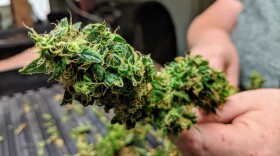-
Farmers across the central U.S. have navigated a myriad of challenges this year, including low crop prices and federal funding cuts.
-
A new documentary profiles ranchers in Greenwood County, Kansas, including a young couple trying to make a go of it as ranchers and small business owners in rural Kansas.
-
Kansas hemp growers and processors say the new, stricter federal law could derail the entire industry. The state has grown to one of the top five hemp producing states in the country.
-
Some Midwestern soybean farmers are selling their beans to be crushed and turned into soybean meal and oil. But economists say domestic processing won't be enough to offset the drop in Chinese demand.
-
Farmers who were promised funding through the federal Regional Food Business Centers have been left in limbo after the Trump administration shut down the program. The U.S. Department of Agriculture says it will honor grants the program already approved, but it's unclear when.
-
The massive legislation extends tax cuts and increases safety nets for farmers who grow commodities, like corn, wheat and rice. But deep cuts to federal food assistance spending could hurt specialty growers who benefit from programs like Double Up Food Bucks.
-
A new rule removes race and gender considerations from federal farm programs. The move comes after the Trump administration terminated or paused millions of dollars worth of funding meant to support small farmers and ranchers, as well as diversity efforts.
-
Farmers continued to take on more debt through the first quarter of 2025, prolonging a trend from last year. That's as farm incomes have shrunk over the last couple of years, and some worry President Trump's tariffs could make economic conditions tougher.
-
The spring planting season is getting started for many Midwest farmers. Federal data suggests that fewer acres will be planted in soybeans than last year, in part because of the U.S. trade war with China.
-
The U.S. trade war with China is coming at a tough time for American farmers, who are already dealing with lower crop prices and higher costs for farm necessities. Tariffs are likely to push crop prices further down, while increasing the costs for fertilizer and farm equipment.

Play Live Radio
Next Up:
0:00
0:00
Available On Air Stations










